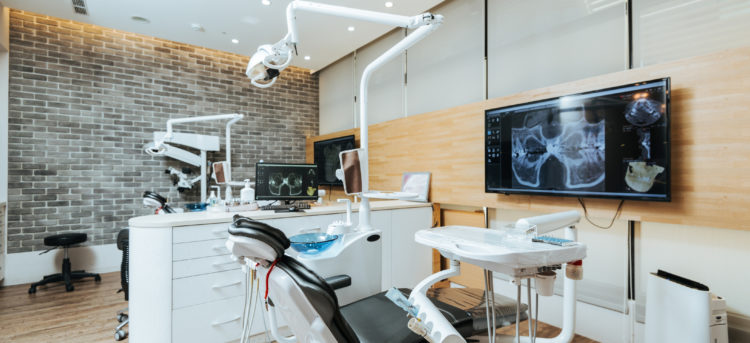This post was reviewed and updated on July 8, 2020
Getting a dental practice loan or equipment financing can be a challenge for new and experienced dentist professionals alike. Whether you’re starting a new dental business, making a dental practice acquisition, or upgrading your practice, you may need to borrow hundreds of thousands of dollars to have the latest dental technology to better serve your patients.
Fortunately, many lenders offer dental office finance options with favorable terms to dentists based on the dental industry’s reputation for repaying loans on time.
Dental Financing for 2020
Dentists may look for financing for several reasons. You might seek dental practice financing for a new business, which might require working capital for office space, new equipment, and staff.
Then, there are dentists who have an existing practice who need to take out a loan or line of credit for a different reason.
“Every dentist has unique needs and comes to us at different points in their careers; they may be ready to expand their practice, want to invest in new equipment, need an injection of cash flow, or need some relief from debt,” says Zach Raus, President, Lending Division, at Bankers Healthcare Group (BHG), which specializes in financing for healthcare professionals.
The reason you’re applying for financing can determine which type of loan may be best. For example, a Small Business Administration (SBA) loan can be a good fit when you’re opening a new practice and need to purchase or lease property. But a line of credit could be a better fit if you’re struggling with cash flow while waiting for payments from insurance providers.
If your business is brand new, you’ll want a startup loan that doesn’t require that you’ve been in business for years.
No matter the situation, you’ll want to compare several dental lenders to find the one that offers the best rates and terms.
Options for Dental Practice Loans
Nav partners with leading small business lenders that provide general business and equipment loans to dentists and other dental practice owners. We’ve listed some of these lenders below, as they may offer small business loans, working capital loans, or lines of credit you can use to help run your business. We’re also highlighting several lenders that have specialized medical or dental practice loans.
Bankers Healthcare Group
Bankers Healthcare Group works with medical professionals in several fields, including dentistry. It offers term loans to existing businesses for up to $500,000 without a personal credit check or personal collateral.
Raus says, “Dentists primarily get business loans from BHG for business development, debt consolidation, and practice improvements, such as new technology or equipment.”
BlueVine
BlueVine is an online lender that offers installment loans, lines of credit, and invoice factoring. Factoring generally only applies to B2B companies, which doesn’t include dental offices. However, a term loan or line of credit could help with more general business financing needs. BlueVine requires a general lien and personal guarantee from business owners for either type of account.
Lendspark
Lendspark’s online equipment financing offers up to $2 million in funding. Depending on your creditworthiness, you may qualify for a low interest rate and no origination fee. You have several options for dental equipment financing, including leases.
SmartBiz
SmartBiz offers online bank loans, SBA loans, and real estate financing. The wide variety of options means you may be able to find a type of financing and offer that suits your needs, although the company doesn’t specifically work with healthcare professionals.
Traditional Banks’ Healthcare Practice Groups
Traditional banks, including Bank of America, PNC, US Bank, and Wells Fargo, have a special financing department for dentists and other healthcare providers. Working with an experienced banker can be beneficial as they’ve seen what’s worked (and what hasn’t) for other dentists and can act as an advisor. Some banks also partner with the ADA to offer lower fees and additional resources to dentists.
How to Qualify for Dental Practice Financing
Lenders can set their own underwriting requirements, and they may vary depending on the type of financing you’re looking for and your plan for what you’ll do with the money. If you’re looking for significant funding to start, buy, or expand your business, you may need to:
- Form a business entity, such as a limited liability company or corporation
- Have a business plan that you can share with the lender if you’re buying or starting a new practice
- Have a history of paying personal debts on time. A personal credit score around 720 or higher can be important for getting good rates, although you can find financing with a lower credit score.
If you’re like many dentists, you might have several hundred thousand dollars in student loans (dental school is expensive!), which may impact your ability to qualify for financing with a general business lender. However, lenders that have experience working with dentists understand that that’s the norm and may ignore the loan balance and focus on your payment history instead.
Having a history of paying all your bills on time, and having enough savings to cover short-term emergencies, can go a long way toward qualifying for dental practice loans. With a strong track record, you may even be able to qualify for a large equipment or dental practice loan without putting any money down or paying an origination fee.
Dental Financing Use Cases
Knowing what you plan to use the funds for can help a lender decide whether to lend you money or not. Here are a few scenarios that might fit.
Starting a New Dental Practice
If you plan on building your practice from the ground up, you may want to look for a graduated loan. These start with low or interest-only payments, which limit your expenses during the initial construction and opening phases. Some creditors will also release loan disbursements over time, either to you or by directly paying your contractors progress payments, which can limit how much interest you have to pay.
Buying a Dental Practice
Purchasing a practice rather than building your own comes with pros and cons. You’ll have immediate cash flow if patients stay with the practice after you acquire it. However, you’ll also inherit potential shortcomings with the staff, equipment, systems, and setup. You may want to look for a loan that covers renovations or equipment upgrades in addition to the purchase price.
Getting More Working Capital
If you’re already running a dental office, you might need financing to help with cash flow or during a slow business period. In these cases, an online lender that offers quick financing may be a good option.
Financing Dental Equipment
Equipment financing loans can be easier to get than general practice loans since you’ll often use the equipment as collateral for the dental loan. Specific equipment loans might not be amortized like small business loans, meaning the loan amount includes the financing charge. In these cases, paying off the loan early won’t save you money because interest isn’t accruing over time. However, some lenders may offer a discount if you can repay the loan in full ahead of schedule.
You could take out a loan to buy dental equipment, or use a lease to rent the equipment. Raus says what’s best depends on the equipment’s cost, maintenance, and the overall impact on your bottom line.
“If the equipment you want is going to make your practice more profitable and efficient over the long term, it probably makes sense to purchase it outright with a loan,” he says. Otherwise, leasing may be a better option.
Replacing Office Equipment
Office equipment won’t be as expensive as medical equipment, and you could compare a wider range of loan options if you’re looking to upgrade your office’s computers and printers. A simple online loan might provide the most straightforward financing. If you’re already working with a lender, you could ask about options for expanding the relationship to upgrade or replace your office equipment.
Investing in Dental Software
From practice management software (PMS) to general accounting and payroll services, your technology needs can change as your practice grows. Involve your whole team in the purchase, and make sure new software will work with your existing setup. Financing can come into play to help pay for the software itself, and you may want to set money aside for training. If you’re changing accounting software, you may need to hire an accountant or bookkeeper to move your books over to the new system.
Is it Possible to Qualify for Dental Practice or Equipment Financing with Bad Credit?
Your personal debt as well as both your personal and business credit will likely be a factor in qualifying for a dental practice loan. However, bad credit won’t necessarily rule you out — it depends on why your credit is bad and the lender.
“If a dentist has bad credit, they should first seek to understand a lender’s approval requirements and how they work with borrowers in their position,” says Raus, “Qualification isn’t solely based on credit, but it’s definitely a part of a borrower’s profile.”
You can look for ways to improve your credit before applying. Then, after improving your credit and business’s finances, you may be able to qualify for a lower-rate loan and use the money to refinance your debt.
If you need capital now, business credit cards or a merchant cash advance from an alternative lender may be your best option, but know you’ll pay more in interest (unless you pay your credit card balance in full before the interest kicks in).
How Many Years Can You Finance Dental Equipment?
The repayment terms of your loan can vary greatly depending on the type of financing you’re using to purchase equipment. If you take out a dental equipment loan, you may have several months to 10 years to repay the loan. But larger practice loans, particularly those that will cover commercial real estate in addition to equipment, could have much longer loan terms of up to 15 or 25 years.
The longer your repayment term, the lower your monthly payment. However, a longer term also means more interest can accrue, which increases your overall cost of financing. Some lending institutions may allow you to repay a loan early without paying a prepayment fee, but longer-term loans could still have higher interest rates.
Nav’s Final Word: Dental Practice Financing
Opening and running a dental office can be a capital-intensive process. It can take several hundred thousand dollars to get started, in addition to the student loans you took on to become a dentist. However, many dentists are able to build a practice, repay all their debt, and build significant wealth over their lifetime.
When you’re looking for dental practice financing, having the right team can be important. You may want to hire an accountant and financial planner who has experience with dentists in your area, and find a lender that can act as a partner (although, don’t forget their bias). You can also reach out to other dentists or classmates and ask about their experience with different lenders.
Also, try to match the financing option you choose to your need. “Dentists are strapped for time; it’s hard for them to get out of the office during regular business hours,” says Raus, “We also find that they need to get their financing fast, especially if they’re using the money to purchase new equipment.”
A bank loan may be best for a large project, but it can take weeks or months to get approved. Online lenders can offer quick and easy financing for smaller projects or when you need working capital. Planning ahead can ensure that you get the money you need when you need it, at the best rate possible.
This article was originally written on January 23, 2020 and updated on July 8, 2020.



Have at it! We'd love to hear from you and encourage a lively discussion among our users. Please help us keep our site clean and protect yourself. Refrain from posting overtly promotional content, and avoid disclosing personal information such as bank account or phone numbers.
Reviews Disclosure: The responses below are not provided or commissioned by the credit card, financing and service companies that appear on this site. Responses have not been reviewed, approved or otherwise endorsed by the credit card, financing and service companies and it is not their responsibility to ensure all posts and/or questions are answered.